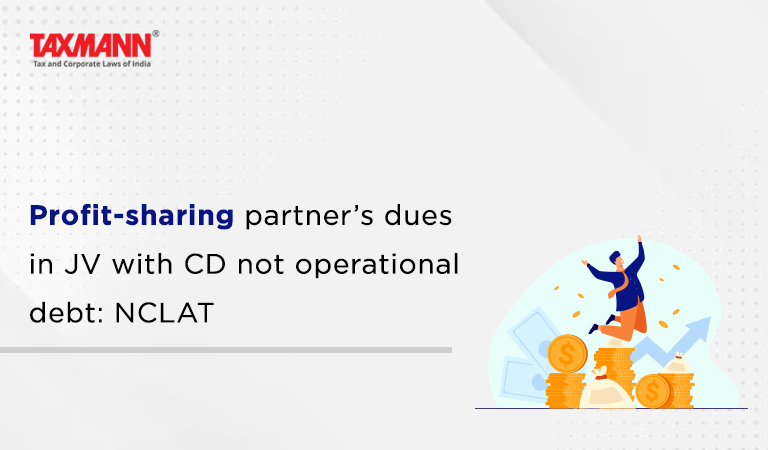Profit-sharing partner’s dues in JV with CD not operational debt: NCLAT
- Blog|News|Insolvency and Bankruptcy Code|
- 2 Min Read
- By Taxmann
- |
- Last Updated on 21 February, 2023

Case Details: Prashanth Shekara Shetty Designated Partner of Abmay Health Ventures LLP v. Alcuris Healthcare (P.) Ltd. – [2023] 147 taxmann.com 66 (NCLAT-New Delhi)
Judiciary and Counsel Details
-
- Justice Ashok Bhushan, Chairperson & Barun Mitra, Technical Member
- Abhijeet Sinha, Mohd. Umar & Aditya Shukla, Advs. for the Appellant.
- Ms S. Janani & Nishant Kumar, Advs. for the Respondent.
Facts of the Case
In the instant case, the Respondent and the Appellant (corporate debtor) entered into an agreement creating a joint venture named SRV Heart Centre. Subsequently, differences arose between the two parties on various issues like settlement of accounts and calculation of profit-sharing ratio.
The Respondent claimed outstanding dues as operational debt and filed application under section 9 of IBC before the Adjudicating Authority (NCLT) for initiation of CIRP.
The NCLT admitted the said application and initiated the CIRP against the corporate debtor. Consequently, an appeal was made to the National Company Law Appellate Tribunal (NCLAT).
The Corporate debtor submitted that agreement entered between the corporate debtor and the respondent was a profit-sharing agreement and breach of such an agreement could not be a ground to trigger the CIRP.
It was further contended that the respondent had not provided any goods or services to corporate debtor. It was noted that, as per agreement, parties were ‘general profit-sharing partners’ and exercised joint control over SRV.
NCLAT Held
The NCLAT observed that the Adjudicating Authority had erroneously admitted the application u/s 9 of IBC. Therefore, the impugned order was to be set aside. Further, the orders passed by the Adjudicating Authority initiating CIRP against the corporate debtor and appointing Interim Resolution Professional and all other orders pursuant to impugned order are declared illegal and set aside.
The NCLAT held that since shared control of interest and shared liability for profit was so clearly manifested, there arose no jural relationship between two parties as one of corporate debtor and operational creditor. Therefore, the outstanding amount claimed by respondent didn’t constitute the operational debt.
In view of the above, the corporate debtor was released from the rigours of CIRP and was allowed to function independently through its board of directors with an immediate effect.
List of Cases Reviewed
-
- Alcuris Healthcare (P.) Ltd. v. Abmay Health Ventures LLP [2023] 147 taxmann.com 65 (NCLT – Mum.) (para 29) reversed [See annex].
List of Cases Referred to
-
- AS Technosoft (P.) Ltd. v. Goldsquare Sales India (P.) Ltd. [2018] 93 taxmann.com 2 (NCLAT – New Delhi) (para 5)
- Drulum India (P.) Ltd. v. Sharma Kalypso (P.) Ltd. [Company Appeal (AT) (Insolvency) No. 351 of 2018, dated 9-7-2018] (para 11)
- Consolidated Construction Consortium Ltd. v. Hitro Energy Solutions (P.) Ltd. [2022] 135 taxmann.com 97/171 SCL 56 (SC) (para 17)
- Mobilox Innovations (P.) Ltd. v. Kirusa Software (P.) Ltd. [2017] 85 taxmann.com 292/144 SCL 37/140 CLA 123/4 Comp. LJ 255/205 Comp Case 324 (SC)/[2018] 1 SCC 353 (para 19).
Disclaimer: The content/information published on the website is only for general information of the user and shall not be construed as legal advice. While the Taxmann has exercised reasonable efforts to ensure the veracity of information/content published, Taxmann shall be under no liability in any manner whatsoever for incorrect information, if any.

Taxmann Publications has a dedicated in-house Research & Editorial Team. This team consists of a team of Chartered Accountants, Company Secretaries, and Lawyers. This team works under the guidance and supervision of editor-in-chief Mr Rakesh Bhargava.
The Research and Editorial Team is responsible for developing reliable and accurate content for the readers. The team follows the six-sigma approach to achieve the benchmark of zero error in its publications and research platforms. The team ensures that the following publication guidelines are thoroughly followed while developing the content:
- The statutory material is obtained only from the authorized and reliable sources
- All the latest developments in the judicial and legislative fields are covered
- Prepare the analytical write-ups on current, controversial, and important issues to help the readers to understand the concept and its implications
- Every content published by Taxmann is complete, accurate and lucid
- All evidence-based statements are supported with proper reference to Section, Circular No., Notification No. or citations
- The golden rules of grammar, style and consistency are thoroughly followed
- Font and size that’s easy to read and remain consistent across all imprint and digital publications are applied



 CA | CS | CMA
CA | CS | CMA
